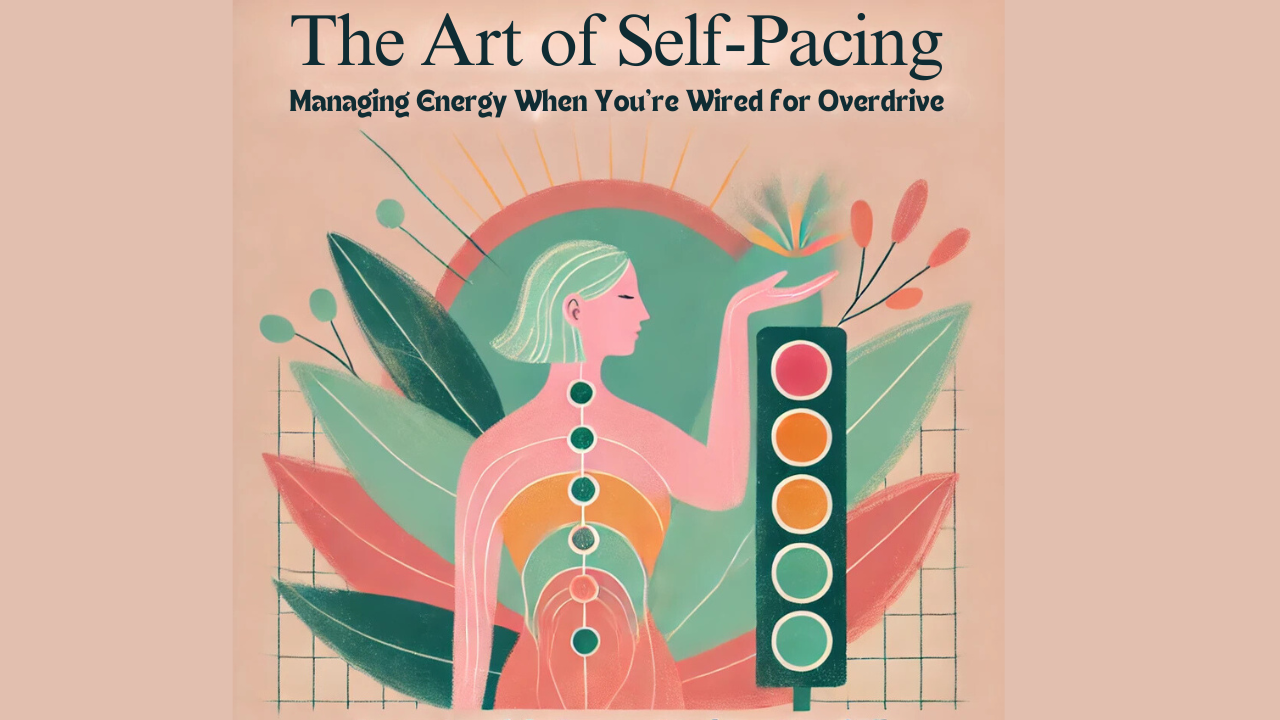The Art of Self-Pacing: Managing Energy When You’re Wired for Overdrive
Dec 01, 2024
Why Self-Pacing Feels So Hard
Ever feel like your brain has two speeds—full throttle or full stop? If you’re neurodivergent, the idea of “pacing yourself” might sound like a foreign language. You’re either in hyperfocus mode, knocking out tasks like a superhero, or completely drained, wondering where all your energy went.
Self-pacing isn’t just about slowing down; it’s about finding a rhythm that works for your brain and body. Let’s explore why it’s so challenging, why it’s so important, and how you can master the art of self-pacing without losing your spark.
Why Neurodivergent Brains Struggle with Self-Pacing
The neurodivergent brain thrives on extremes. Whether it’s hyperfocus or sensory overwhelm, you’re wired for intensity.
Why pacing feels impossible:
- All-or-Nothing Thinking: It’s easy to feel like you need to “do it all” or do nothing at all.
- Delayed Awareness of Burnout: You might not notice you’re running on empty until you’ve hit the wall.
- The Dopamine Chase: Tasks that offer instant rewards (hello, hyperfocus) are hard to resist, even if they drain your energy.
What Is Self-Pacing, Really?
Self-pacing is about balancing effort and rest in a way that keeps your energy steady over time. Think of it like driving a car—rather than speeding and slamming the brakes, you’re cruising at a sustainable pace.
Benefits of self-pacing:
- Reduces burnout.
- Improves productivity.
- Helps you stay connected to your values and priorities.
The Stoplight System for Self-Pacing
Tip: Use the Stoplight System to check in with your energy throughout the day:
- Green: You’re energized and ready to tackle tasks. Lean into focus-friendly work.
- Yellow: You’re starting to feel fatigued. Take a break or shift to a less demanding activity.
- Red: You’re drained. Stop, rest, and recharge—no guilt allowed.
Practical Strategies for Mastering Self-Pacing
1. Schedule Micro-Breaks
You don’t need an hour-long nap to reset—sometimes a five-minute pause is enough.
- Stretch, hydrate, or step outside for fresh air.
- Use timers or apps to remind yourself to take breaks.
2. Embrace Energy Mapping
Track your energy levels throughout the day to identify your natural peaks and dips.
- Reserve high-energy times for focus-intensive tasks.
- Use low-energy periods for restorative activities.
3. Set “Enough” Goals
Perfectionism loves to derail self-pacing. Instead of aiming for perfect, set “enough” goals—tasks that are realistic given your current energy.
4. Use a System to Help You Stay On Track Applications have come a long way. Using a calendar app that integrates everything you need, from events, task management, email and timing/time blocking, setting a Focus time and using a Pomodoro Method. Sunsama is an all-in-one Neurodivergent Persons answer.
The Role of Self-Compassion in Self-Pacing
It’s easy to feel guilty for resting, especially in a culture that glorifies hustle. But rest isn’t lazy—it’s essential.
Practice mindful self-compassion:
- Acknowledge that you deserve rest just as much as productivity.
- Use affirmations like, “Resting now helps me do my best later.”
Why Self-Pacing Matters
When you master self-pacing, you’re not just managing your energy—you’re reclaiming it. It’s about creating space for both rest and growth, honoring your neurodivergence every step of the way.
Ready to Thrive at Your Own Pace? Let’s Work Together.
If you’re ready to find your rhythm and stop running on empty, my coaching program for neurodivergent women is here to help. Together, we’ll create custom strategies for energy management and sustainable success.
Let’s make self-pacing your superpower.
– Dawn Leprich-Graves, LCPC, LPC, PMH-C, ASDCS Clinician, Coach & Connection Catalyst
*This blog contains affiliate links that may provide me with a discount on my own services. Please know, I only recommend products and services I personally use and have had an amazing experience with.

